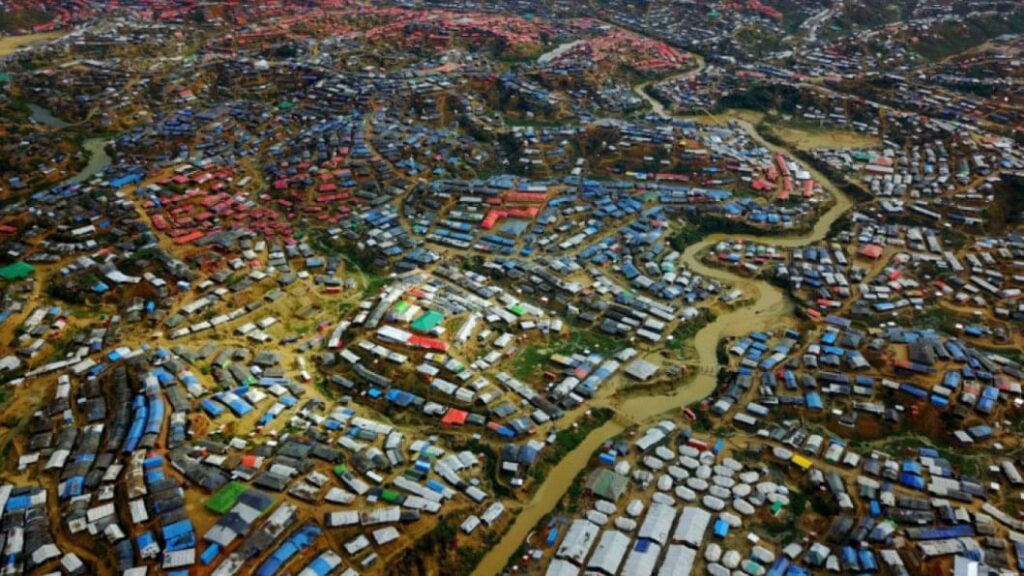Last update on: Fri Jun 9, 2023 10:16 PM
There is no denying the fact that more than 730,000 forcibly displaced Rohingya living in the camps at Ukhiya and Teknaf upazilas in Cox’s Bazar since August 2017, with a traumatic past and an uncertain future, is a grave humanitarian crisis. But this large-scale influx, in an ecologically vulnerable region like Cox’s Bazar, has had a significant negative impact on the host communities, particularly the poor population. While the Rohingya have received massive international and national attention and resources, and rightly so, the plights of these poor locals brought on by the Rohingya influx usually does not get the attention it deserves.
Several research and surveys indicate that since 2017, when the Rohingya crisis began, income and employment opportunities in the host communities have significantly fallen. For example, a study by SMA Ullah, et. al. found that between 2015 and 2020, the average income decreased by 11 percent in the host communities while the national income grew by about five percent every year during the same time. A 2021 survey by the Brac Institute of Governance and Development (BIGD) found that the employment rate in Cox’s Bazar was almost 20 percentage points lower than the national average, even among men.
The negative impact can be attributed primarily to the increase in labour supply, with the Rohingya people informally (and illegally) offering labour at a cheaper rate as they do not have any other option. And naturally this increased supply has had the worst impact on the poorest locals, because their livelihoods – manual labour, petty business, and primary activities (notably fishing in Cox’s Bazar) – are usually the jobs taken up by the Rohingya, who are unlikely to have the necessary skills or resources to pursue other (better) livelihood options.
Supporting the poor people affected by the Rohingya crisis is crucial for maintaining stability in the region and a good relationship between the two communities. Many members of the host communities now harbour negative feelings about the Rohingya because of several reasons, including the competition in the local labour market. Supporting them also has a strong humanitarian appeal; after all, they are vulnerable, too, due to poverty.
There are some initiatives to support the poor in the host communities, and the ultra-poor graduation (UPG) programme offered by Brac to the extreme-poor households is a notable one, which started in Ukhiya and Teknaf in 2018, in collaboration with partners including the UNHCR. Since then, 8,000 extreme-poor households in these two upazilas have received a host of services to improve their livelihoods, including technical and soft skill training, savings, healthcare and social safety nets, community integration, awareness raising, and hands-on coaching under the UPG programme. They also received funding to buy productive assets or to start a business. The most vulnerable households received a grant, and the slightly better-off ones received a combination of grants and credit.
In Cox’s Bazar, the size of the local economy is increasing due to both the Rohingya crisis and tourism. However, the local poor do not necessarily have a share in this growing pie; rather they suffer without intervention, as is clear from the data shared here. Thus, building their capacity to produce marketable goods and then connecting them with the market so that they can sell their products at good prices seems to be working well.
BIGD researchers Narayan Das, et.al. evaluated the programme and found encouraging results. The study found that the programme significantly increased the labour supply among the participating households who received support in 2018, especially women. As a result, two years after the programme started, the per capita income increased by more than 25 percent. The value of their assets increased significantly, over 25 percent for land and more than 150 percent for other productive assets. Their savings and food security also increased significantly.
One important aspect of the UPG programme is creating market linkages for the participants who are now producing different marketable products and accumulating productive assets to expand their trade. To this end, the programme increased the capacity of 2,000 participants – how to negotiate, how to ensure quality, etc – organised them in groups for bulk-supplying and purchasing and better negotiating, and finally connected them with backward and forward linkages. The participants were also linked with relevant government extension services for accessing available technical services and inputs.
In Cox’s Bazar, the size of the local economy is increasing due to both the Rohingya crisis and tourism. However, the local poor do not necessarily have a share in this growing pie; rather they suffer without intervention, as is clear from the data shared here. Thus, building their capacity to produce marketable goods and then connecting them with the market so that they can sell their products at good prices seems to be working well.
Intensive, holistic programmes like the UPG hold a strong promise to reverse the economic damage done by a major crisis, not only related to a sudden, large-scale human migration, but also in other crisis situations such as natural disasters.
It is usually the poor who suffer the brunt of any crisis, be it man-made or natural, because they do not have the necessary power, resources or voice to protect themselves. The poor and the vulnerable, thus, must be provided support to weather a regional or national crisis. It is crucial for continuing our progress, and avoiding any regress, towards human development and building a just and prosperous Bangladesh.
Nusrat Jahan is the head of Communications and Knowledge Management at Brac Institute of Governance and Development (BIGD).

